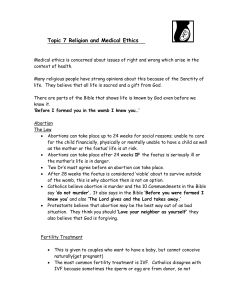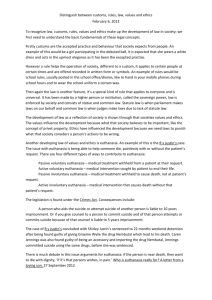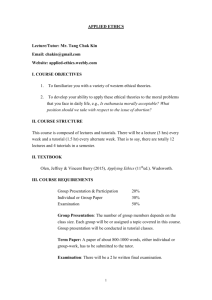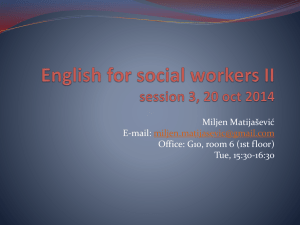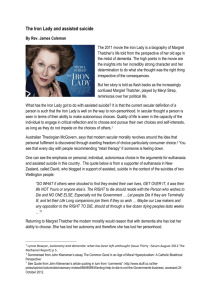Death and the Law
advertisement
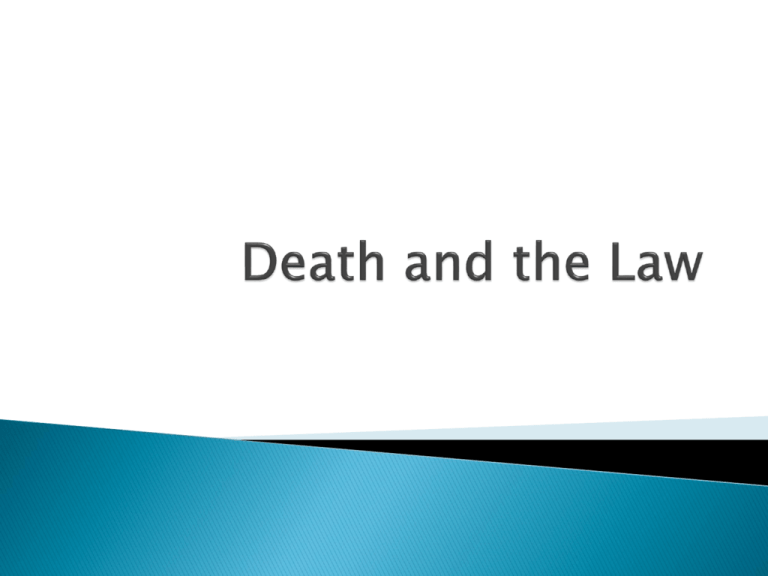
Revision (crime) Suicide Abortion The Death Penalty Euthanasia What is a crime? How are crimes classified? What are three main categories of crimes? Who can be exempt from criminal liability? treason / conspiracy murder / manslaughter theft / robbery / burglary to prove beyond reasonable doubt to be presumed innocent exemption from criminal liability Indictable offences are more serious offences triable on ___________ by a judge and a jury in a ___________ Court. Summary offences are less serious offences triable summarily in a ____________ Court by the justices who sit without a _________. To secure conviction, the prosecution must normally prove beyond reasonable doubt that the accused committed a guilty act with a guilty intent. The accused is presumed innocent until proved by the prosecution in a court of law to be guilty. The act of taking one’s own life voluntarily and intentionally In the past an attempt to kill oneself resulted in a charge with a criminal offence In the 14th century English Common Law made suicide a criminal act and it was punished by forfeiture of all the goods and chattels of the offender. English Common Law distinguished a suicide committed by an unsound mind from an “evil doer against himself”, who had coolly decided to end his or her life (an infamous crime) – entire estate forfeited to the crown; Ignominious burial – a corpse dragged through the streets and hung from the gallows, and finally buried beneath a crossroad with a stake driven through the body by the 17th century – a suicide forfeited only personal property; heirs could get his real estate until 1879 law did not distinguish between suicide and homicide The Suicide Act of 1961 abolished that BE IT ENACTED by the Queen's most Excellent Majesty, by and with the advice and consent of the Lords Spiritual and Temporal, and Commons, in this present Parliament assembled, and by the authority of the same, as follows:– 1 Suicide to cease to be a crime The rule of law whereby it is a crime for a person to commit suicide is hereby abrogated. 2 Criminal liability for complicity in another's suicide (1) A person who aids, abets, counsels or procures the suicide of another, or an attempt by another to commit suicide, shall be liable on conviction on indictment to imprisonment for a term not exceeding fourteen years. (2) If on the trial of an indictment for murder or manslaughter it is proved that the accused aided, abetted, counselled or procured the suicide of the person in question, the jury may find him guilty of that offence. The termination of pregnancy before it is complete with the purpose of destroying the foetus Before 1967 it was a criminal act to end, or to help to end a pregnancy The main question: Is the foetus a human being with its rights or is it part of the body of the mother? Pro life and pro choice Since life begins at conception, abortion is akin to murder as it is the act of taking human life. Abortion is in direct defiance of the commonly accepted idea of the sanctity of human life No civilized society permits one human to intentionally harm or take the life of another human without punishment, and abortion is no different. Adoption is a viable alternative to abortion and accomplishes the same result. Nearly all abortions take place in the first trimester, when a fetus cannot exist independent of the mother. As it is attached by the placenta and umbilical cord, its health is dependent on her health, and cannot be regarded as a separate entity as it cannot exist outside her womb. A pregnancy may be terminated within the time limit of 24 weeks The time limit does not apply where abortion is performed to save lives An abortion must be performed by a registered medical practicioner in a hospital or a place officially approved for that purpose The Act does not apply in Northern Ireland Roe v. Wade – the most important precedent The Supreme Court issued its decision in Roe v. Wade on January 22, 1973 in which the justices ruled 7-2 that abortion was a fundamental right protected by the United States Constitution. Justice Harry Blackmun, writing for the majority, declared that the right of privacy protected by the Fourteenth Amendment and previously outlined in Griswold “is broad enough to encompass a woman’s decision whether or not to terminate her pregnancy.” https://www.youtube.com/watch?v=8DJ2JB9i c5A Which US Constitution amendments were quoted in the argument? What was ‘the worst joke in legal history’? Explain ‘the zone of privacy’! What is the main question in Planned Parenthood v. Casey (1992) case? What was the court’s conclusion? Amendments: 1st, 4th, 9th, 10th, 14th The worst joke in legal history: Arguing against two female attorneys, Floyd begins: “It’s an old joke, but when a man argues against two beautiful ladies like this, they are going to have the last word.” Issue: Can a state require women who want an abortion to obtain informed consent, wait 24 hours, and, if minors, obtain parental consent, without violating their right to abortions as guaranteed by Roe v. Wade? Conclusion: The Court reaffirmed Roe, but it upheld most of the Pennsylvania provisions. For the first time, the justices imposed a new standard to determine the validity of laws restricting abortions. The new standard asks whether a state abortion regulation has the purpose or effect of imposing an "undue burden," which is defined as a "substantial obstacle in the path of a woman seeking an abortion before the fetus attains viability." Under this standard, the only provision to fail the undueburden test was the husband notification requirement. In Great Britain, hanging was the preferred method of execution for hundreds of years Capital punishment was suspended in 1965 and abolished in 1970 Abolitionists (fighters against the death penalty) and retentionists (supporters of the death penalty) The last woman to be hanged in Great Britain Ellis (28) shot her boyfriend David Blakely in 1955 “battered woman syndrome” Ellis had a miscarriage 10 days before the killing because Blakely punched her “It was obvious that when I shot him, I intended to kill him” The jury reached the verdict in 14 minutes Ellis executed three weeks later The case reopened in 2003 – the relatives wanted to replace the decision with a verdict of manslaughter on the grounds of ‘provocation’ or ‘diminished responsibility’ “Substantial error” because the judge refused to allow the jury to consider the provocation defense New verdict refused http://www.youtube.com/watch?v=uXQvKLG YTho Literally: Good death (from the Greek words “eu” and “thanatos”) Also called ‘mercy killing’ Intentional killing by act or omission of a dependant human being for his or her alleged benefit Voluntary: when the person who is killed has requested to be killed Non-voluntary: when the person who is killed made no request and gave no consent Assisted suicide: someone provides an individual with the information, guidance and means to take their life with the intention that they will be used for a purpose Euthanasia by action (active authanasia): intentionally causing a person’s death by performing an action such as by giving a lethal injection Euthanasia by omission (passive euthanasia): intentionally causing death by not providing necessary and ordinary care The Netherlands was the first country to allow so-called mercy killing Public approval ratings of nearly 90 % for legalisation of euthanasia Doctors have the right to refuse and patients have the right to choose euthanasia The patient must have an incurable illness There must be “unbearable suffering” The patient must be of sound mind and must have given consent The termination of life must then be carried out in a medically appropriate manner Since 2002, euthanasia was legalised in several countries (e.g. Switzerland) In Croatia all forms of euthanasia are illegal Forfeiture – oduzimanje imovine Goods and chattels - imetak Ignominious burial – nečasni pogreb Abolitionist – protivnik smrtne kazne Retentionist – zagovornik smrtne kazne Miscarriage – spontani pobačaj Diminished responsibility – smanjena odgovornost Incurable illness – neizlječiva bolest Fill in the blanks with the most appropriate word: painless, intolerable, incurable, criminal,undignified Euthanasia is the practice of terminating the life of a human being or animal with an ____________ disease, ______________ suffering, or a possibly _____________ death in a ____________ or minimally painful way, for the purpose of limiting suffering. It is a form of homicide; the question is whether it should be considered justifiable or ___________. Euthanasia is the practice of terminating the life of a human being or animal with an incurable disease, intolerable suffering, or a possibly undignified death in a painless or minimally painful way, for the purpose of limiting suffering. It is a form of homicide; the question is whether it should be considered justifiable or criminal. ___________________ – where a person is killed against their expressed wishes ____________________ is the act of deliberately assisting or encouraging another person who commits, or attempts to commit, suicide. ___________________ – where a person deliberately intervenes to end someone’s life, for example, by injecting them with sedatives ___________________ – where a person causes death by withholding or withdrawing treatment that is necessary to maintain life ____________________ - where a person makes a conscious decision to die and asks for help to do this _____________________ – where a person is unable to give their consent INVOLUNTARY EUTHANASIA – where a person is killed against their expressed wishes ASSISTED SUICIDE is the act of deliberately assisting or encouraging another person who commits, or attempts to commit, suicide. ACTIVE EUTHANASIA – where a person deliberately intervenes to end someone’s life, for example, by injecting them with sedatives PASSIVE EUTHANASIA – where a person causes death by withholding or withdrawing treatment that is necessary to maintain life VOLUNTARY EUTHANASIA - where a person makes a conscious decision to die and asks for help to do this NON-VOLUNTARY EUTHANASIA– where a person is unable to give their consent Both euthanasia and assisted suicide are illegal under English law. Depending on the circumstances, euthanasia is regarded as either manslaughter or murder and is punishable by law with a maximum penalty of up to life imprisonment. Assisted suicide is illegal under the terms of the Suicide Act (1961) and is punishable by up to 14 years' imprisonment. Attempting to commit suicide is not a criminal act in itself. Capital punishment Term capital from latin capitalis ˝regarding the head˝ Killing of a person by a judicial process The most severe punishment for an offense The first established death penalty laws date as far back as the 18th Century BC in the Code of King Hammurabi of Babylon It codified the death penalty for 25 different crimes Ancient Greece, where the Athenian legal system was first written down by Draco In 1700s Britain there were 222 crimes which were punishable by death In April 1999, the UN Human Rights Commission passed the Resolution Supporting Worldwide Moratorium on Executions Over 50 countries still retain the death penalty In 2006, 91% of all known executions were carried out in 6 countries: China, Iran, Pakistan, Iraq, Sudan and the United States Death Penalty Permitted: Afghanistan, Cameroon, China, Congo, Cuba, Iraq, Jamaica, Japan, North Korea, South Korea, Nigeria, Pakistan, Thailand, United States etc. Death Penalty Outlawed for Ordinary Crimes -permitted only for exceptional crimes, such as crimes committed under military law or in wartime: Bolivia, Brazil, El Salvador, Kazakhstan, Israel, Latvia, Peru Today over 60 % of Americans support the death penalty in theory In most countries public opinion is against the death penalty, as it is regarded inhuman and many innocent persons were wrongfully executed People who are against the death penalty Lord Kennet’s speech given on November 9, 1961 in the House of Lords outlined main arguments against the death penalty Read Lord Kennet’s speech (Unit 21) and summarise his arguments under five verbs he uses: Prevent Reform Research Deter Avenge Giving a brief account of the main points of some writing Use key words and find a topic sentence Paraphrase when necessary Write a short summary of Lord Kennet’s speech outlining his main ideas To prevent the same man from doing it again Rehabilitate: a man should be helped with his social function by a rehabilitatory treatment Research: We should find out about the motives, characters and personality structures of criminals, thus finding things that would enable taking measures to reduce the crime rate Deter: The evidence proves that the death penalty is not an effective deterrent against violent crime Avenge: Vengeance is not a proper motive for the State in dealing with convicted criminals People who support the death penalty Main arguments: deter and avenge (“an eye for an eye”) Main question: is the capital penalty a uniquely effective deterrent against murder? The death penalty fulfils a preventive function, but it is also very clearly a form of revenge. The human life is ended and the executed person is deprived of the opportunity to change, to restore the harm done or compensate for it. Before advocating execution we should consider whether criminals are intrinsically negative and harmful people or whether they will remain perpetually in the same state of mind in which they committed their crime or not. The answer, I believe, is definitely not. However horrible the act they have committed, I believe that everyone has the potential to improve and correct themselves. Therefore, I am optimistic that it remains possible to deter criminal activity, and prevent such harmful consequences of such acts in society, without having to resort to the death penalty. Article 21 Every human being has the right to life. In the Republic of Croatia there shall be no capital punishment.

